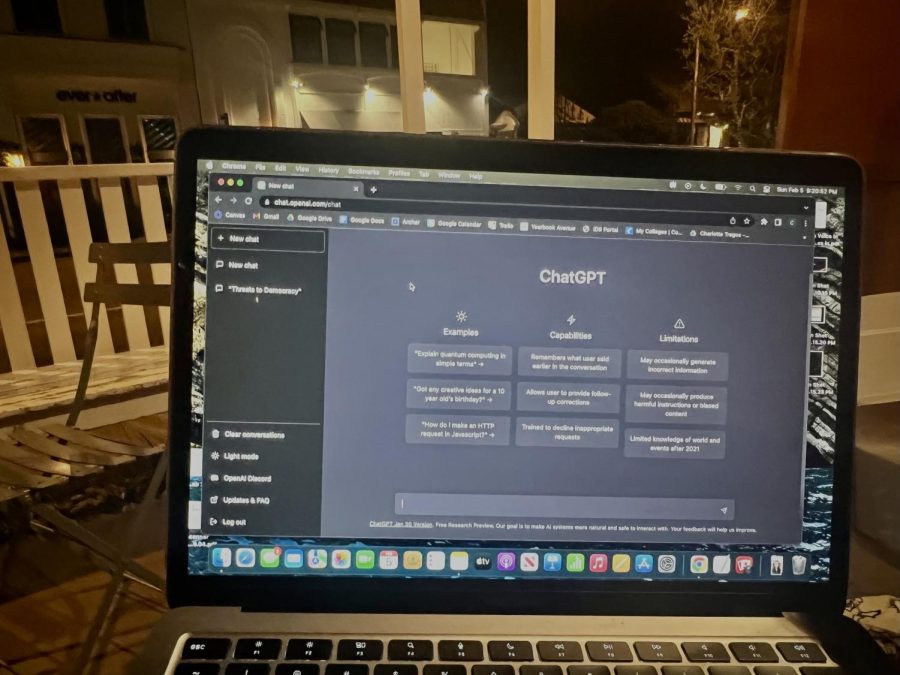Column: “Democracy: The Gift That Keeps on Giving (Threats)”
Photo credit: Charlotte Tragos
Chat GPT’s home-screen illuminates the dangers and capabilities of the software. Among the more dangerous limitations are the spread of misinformation and lies.
March 14, 2023
Before we begin, a warning: this column is not what it seems.
Ladies and gentlemen, democracy: the ultimate game of thrones. The more we have it, the more we want to protect it. But what exactly are we protecting it from? As it turns out, there are plenty of dangers lurking in the shadows, waiting to pounce on our precious democratic rights. So, without further ado, let’s dive into the top contenders for the title of “Greatest Threat to Democracy.”
First up, we have voter suppression. This is the dark horse of the bunch, sneaking up on us with tactics like strict voter ID laws and purging voter rolls. It’s the ultimate party pooper, trying to prevent certain groups from having their say in the election. But don’t worry, democracy has a few tricks up its sleeve to combat this sneaky threat.
Next, we have political polarization. Think of it as the ultimate game of tug-of-war, with each side pulling harder and harder until the rope snaps. As people become more entrenched in their political beliefs, it becomes harder for them to find common ground and compromise. This leads to gridlock and ineffective governance, and a rise in extremism and hate speech. But, like any good game of tug-of-war, sometimes it takes a little bit of teamwork to get things moving again.
Then we have foreign interference, the ultimate wild card. With the advent of social media and other online platforms, foreign actors can now interfere in elections and sow discord in democratic societies. But, democracy is not one to be caught off guard, and is constantly finding new ways to protect itself from this ever-evolving threat.
Economic inequality is the elephant in the room, it’s hard to ignore and even harder to address. When a small number of people have disproportionate influence over the political process, it leads to policies that benefit the wealthy at the expense of the majority. But, like any good game of Jenga, a strong foundation and a steady hand can keep the tower from falling.
Finally, we have corruption, the ultimate snake in the grass. It can take many forms, from bribery and embezzlement to nepotism and cronyism. It undermines the rule of law and erodes public trust in government. But, like any good game of snake, a keen eye and quick reflexes can prevent it from biting.
In conclusion, democracy is a precious gift, and like any gift, it needs to be protected and nurtured. By being aware of these threats and taking action to address them, we can work to strengthen and preserve the democratic institutions that are the foundation of our society. So, let’s roll up our sleeves, put on our game faces, and get ready to play.
Thanks, Chat GPT. This morning I asked the AI to “write a witty and smart column about the greatest threats to democracy.” It delivered. Robots are taking over the world. Online posts, messages, opinions and even columns can be created by this programming; this potential is devastating. How can we trust one another to tell the truth if all networks are proliferated with untruths? What amount of my column is even correct? The robot has stuck in a bunch of confusing metaphors and cryptic references that serve the claim: democracy has failed, and we’re at fault.
My congressman, Ted Lieu, conducted a similar experiment, asking Chat GPT to compose a resolution for AI regulation. It specifies that congress has a “responsibility to ensure that the development and deployment of AI is done in a way that is safe, ethical, and respects the rights and privacy of all Americans.”
So what can you do? Be a more conscious reader. Be a more conscious thinker. Be a better learner and consumer.
And in an effort to protect national security and prevent the spread of misinformation and extremist propaganda, AI must be regulated. This issue may justifiably not be top of mind for many Americans as social injustices continue to batter our country. But in the long game of combatting ailments, AI must be a partner of progress and not an agent of uprooting destruction.









